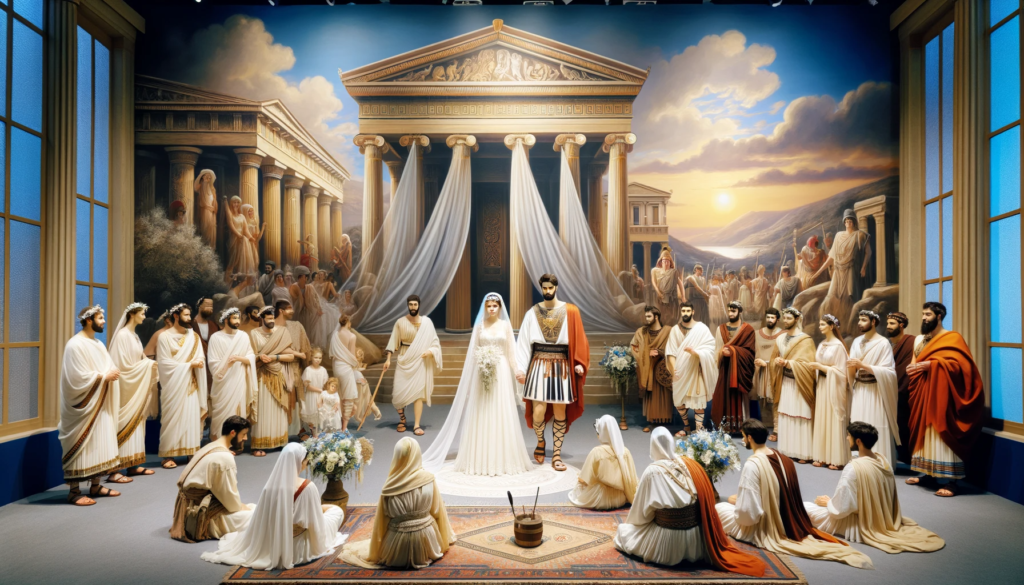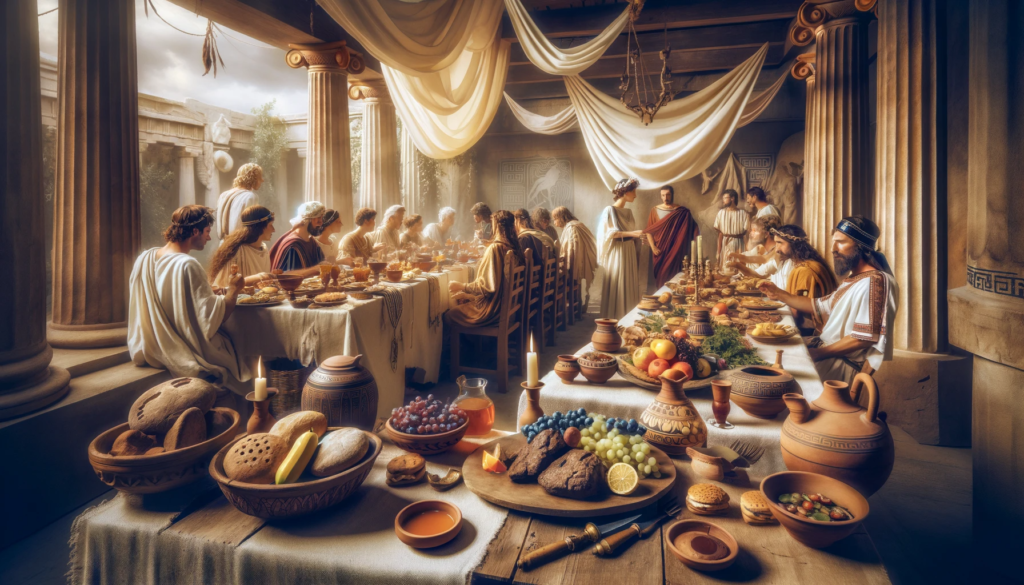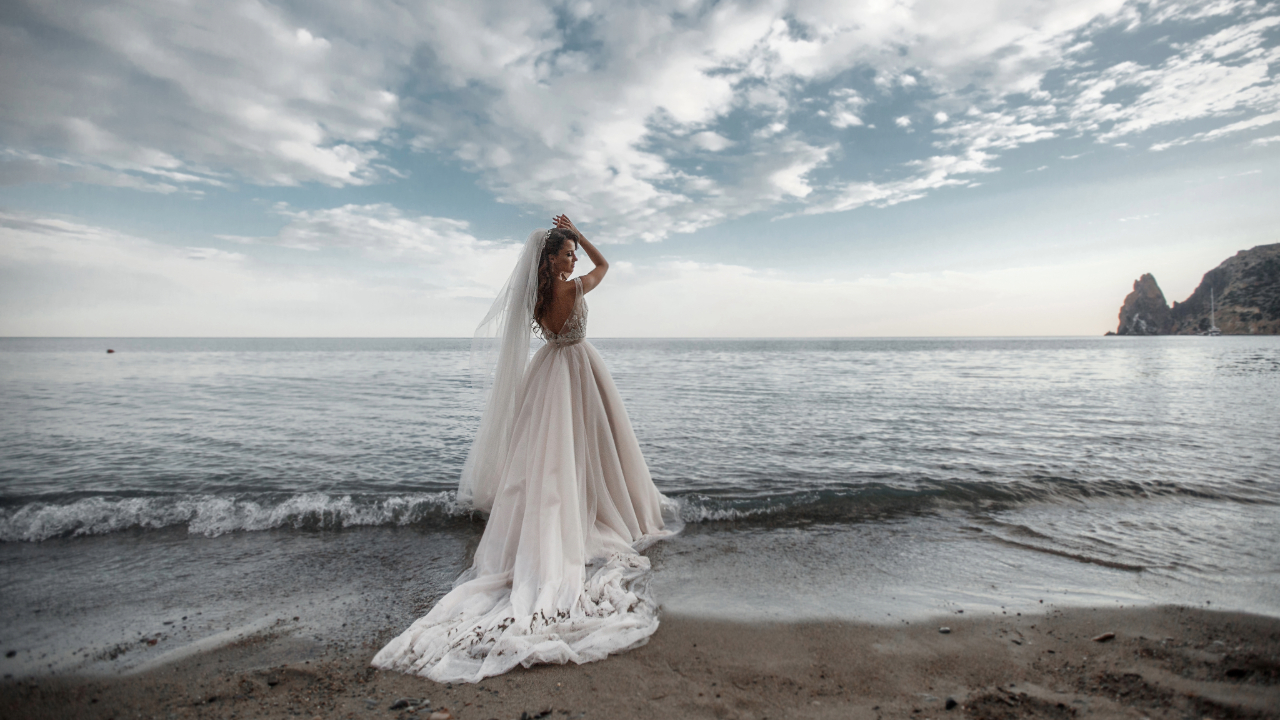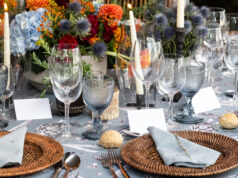Picture this: you’re stepping back in time to the days of Ancient Greece, a world where mythology and tradition deeply influence every aspect of life, especially weddings. Imagine the enchanting blend of love, cultural richness, and historical rituals that these ancient ceremonies encapsulated. If you’re fascinated by the idea of weaving a bit of this historical magic into your special day, then you’re in for a treat! In this article, we’ll dive into some charming ancient Greek wedding traditions and explore how you can sprinkle a bit of this ancient allure into your modern wedding.
We’re talking about a time when weddings were not just about the couple but were grand events that involved entire communities, honoured the gods, and celebrated new beginnings with rituals that have stood the test of time. Let’s embark on this journey together, discovering how these age-old customs can add an extra layer of depth and meaning to your wedding day.
▶️ Read also: Cost breakdown for a Greek island wedding
The significance of ancient Greek weddings
In ancient Greek society, weddings were more than just the joining of two hearts; they were integral to the social and religious fabric of the time. Historians like Sarah B. Pomeroy, in her work Families in Classical and Hellenistic Greece, highlight how these marriages were crucial in ensuring the continuity of family lines and creating alliances between families. This was especially important in a society where heritage and lineage played pivotal roles.
Greek weddings were not just social arrangements, but also deeply rooted in religious beliefs. These ceremonies were rich with rituals dedicated to various gods and goddesses, most notably Hera, the goddess of marriage and family. These rituals were believed to secure divine favour and blessings for the couple, which was essential for a prosperous life.
Furthermore, marriage ceremonies were a way to demonstrate wealth and status. The opulence of the wedding feast, the quality of gifts exchanged, and the number of guests invited were all indicators of a family’s social standing. This aspect of ancient Greek weddings highlights the importance of public perception and societal status during that era.
In essence, ancient Greek weddings were a complex blend of social, religious, and economic considerations. They were a means of securing one’s place in society, appeasing the gods, and celebrating the union of not just two individuals, but two families. As we look back at these traditions, we find a rich source of inspiration for modern weddings, offering a unique way to connect with history and culture.

The engagement: Symbolic rituals
In the ancient Greek tradition, the engagement was the initial step in the marriage process, laden with symbolism and deep cultural significance. Engagements in Ancient Greece were not just romantic gestures but also contractual agreements between two families. The exchange of gifts, particularly rings, was a central feature of this engagement process. These rings, often intricately designed with symbols like the Herakles knot or the Greek key motif, represented unbreakable bonds and eternal commitment. They were not only a promise of marriage but also a public declaration of unity and alliance.
The ritual of ‘engue’ involved a formal agreement or betrothal before witnesses, which legally bound the couple to each other. This ceremony often included the offering of a dowry by the bride’s family, emphasizing the economic and social dimensions of the engagement. The dowry, comprising money, property, or goods, was a crucial aspect of Greek engagements, serving as both a protective measure for the bride and a symbol of alliance and goodwill between the families. In modern times, these symbolic gestures can be reinterpreted and adapted, allowing couples to honour these ancient customs in a way that resonates with their personal values and contemporary lifestyles.
▶️ You may like: Choosing the perfect Greek island for your wedding
Pre-wedding preparations: The bridal bath
One of the most enchanting and symbolic rituals in ancient Greek wedding traditions was the bridal bath. This ritual involved the bride being bathed in water collected from a sacred spring or river. This act was not merely for physical purification but held a deeper, spiritual significance. It was believed that the water, often drawn from locations like the River Kephisos, had divine properties and would cleanse the bride of her maidenhood, preparing her for her new life as a wife. The water was sometimes mixed with other elements, such as olive oil, also a symbol of purity and blessing in Greek culture.
This ritual, steeped in religious and cultural meaning, was a crucial rite of passage for the bride, marking her transition from maidenhood to married life. In modern interpretations, couples can recreate this by incorporating a symbolic water element into their pre-wedding preparations, perhaps in a more subdued ceremony that reflects the original intent of purification and preparation for a new life chapter.
Wedding attire: Echoing the past
The attire worn by ancient Greek brides and grooms was a distinctive and integral part of their wedding ceremonies, rich in symbolism and beauty. Historian Pauline Schmitt Pantel, in her work A History of Women in the West: From Ancient Goddesses to Christian Saints, highlights that ancient Greek brides often wore long chitons, which were tunics made from a single piece of cloth. These were typically white, symbolizing purity, and were sometimes adorned with intricate patterns. Alongside the chiton, brides wore special crowns made from plants like ivy or myrtle, or even precious metals, symbolizing love and fertility. The groom’s attire was simpler, usually consisting of a white tunic and cloak, reflecting the solemnity of the occasion.
Incorporating these elements into modern wedding attire can add a touch of ancient elegance and significance. For instance, brides today might choose to wed gowns inspired by the chiton, with flowing fabrics and Grecian draping. The addition of a headpiece, such as a laurel wreath or a delicately woven crown of olive branches, can pay homage to the traditional crowns worn in ancient times. Similarly, grooms might opt for suits in white or cream, with simple yet elegant designs, to echo the traditional attire. By blending these ancient elements with contemporary fashion, couples can create a wedding look that is both timeless and personal, bridging the gap between the past and the present.
The wedding ceremony: Honouring the gods
Ancient Greek wedding ceremonies were deeply rooted in religious practices, with specific rituals to honour the gods. The most important deity in these ceremonies was Hera, the goddess of marriage. Couples would offer sacrifices and prayers to Hera, seeking her blessings for a fruitful and harmonious marriage. These rituals often took place at the family altar, a sacred space within the home. In addition to Hera, other gods like Aphrodite, the goddess of love, and Hymenaios, the god of marriage ceremonies, were also invoked to bless the union.
Modern couples can pay homage to these traditions by incorporating elements that symbolize the ancient rituals. For instance, setting up a small altar or decorative space at the wedding venue where symbolic offerings can be made. These offerings could be modern interpretations, like flowers, fruits, or even written vows and poems, symbolizing the couple’s hopes and prayers for their marriage. Another idea is to include readings or blessings inspired by ancient Greek mythology or poetry during the ceremony, creating a link to the past while celebrating the couple’s future.
The wedding feast: A blend of old and new
The wedding feast in Ancient Greece was a grand affair, as noted by historian John Wilkins in Food in the Ancient World. These feasts were lavish and communal, featuring an array of dishes that were both symbolic and celebratory. Common foods included figs, olives, and wine, which were staples of the Greek diet and held symbolic meanings of fertility, peace, and joy. Meat, such as lamb, was also often served, signifying abundance and prosperity. The wedding cake, made with honey and sesame seeds, symbolized sweetness and longevity in the couple’s life together.
In modern weddings, couples can embrace these ancient culinary traditions by incorporating Greek dishes and flavours into their menu. A contemporary twist on the traditional wedding feast might include gourmet versions of these ancient foods, like fig and olive canapés, lamb dishes with modern seasoning, and fine Greek wines. For dessert, a honey-flavoured cake or pastries with sesame can complement the theme. Additionally, serving these dishes in a communal style, with shared platters and family-style servings, can reflect the communal nature of ancient Greek feasts, fostering a sense of unity and celebration among the guests.

Ancient Greek wedding traditions offer a rich tapestry of customs that can beautifully complement modern weddings. By integrating elements like symbolic rituals, traditional attire, and cultural feasts, couples can create a unique and memorable celebration that honours a glorious past.






